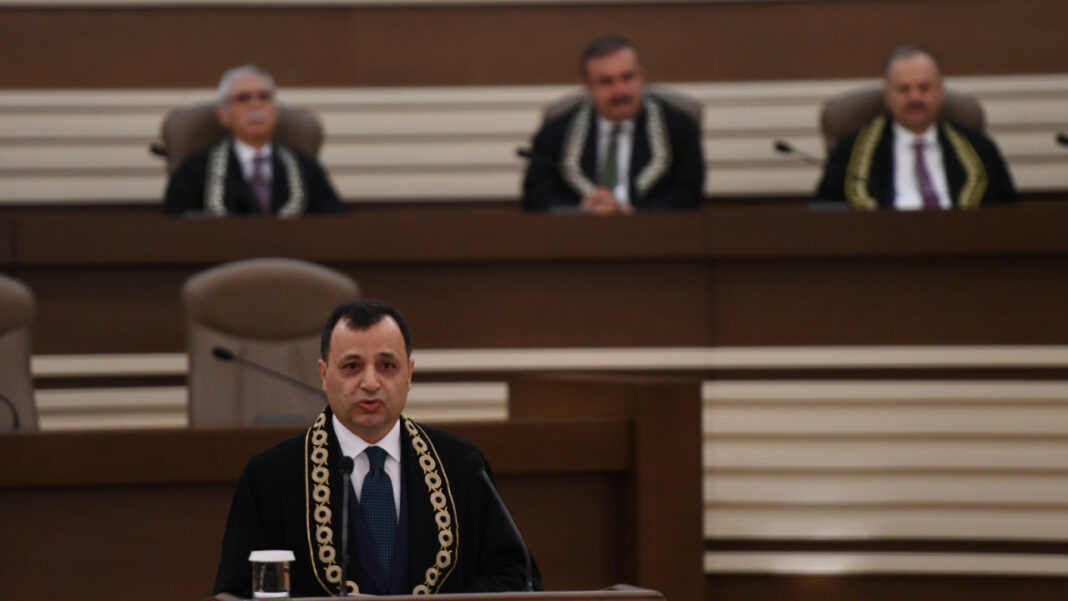The Constitutional Court annulled many articles of the first decree law issued by President Recep Tayyip Erdoğan following the transition to the presidential system, particularly due to violations of constitutional and legal provisions related to the protection of personal data and prevention of environmental destruction.
Bianet English, February 28, 2024
The Constitutional Court published yesterday (February 27) its decision on December 30, 2023, regarding the annulment of many articles of the 1st Presidential Decree Law issued by Erdoğan on July 10, 2018.
Provision enabling profiling of personal data of public servants annulled
The focus of the Constitutional Court’s decision is on the annulment of the 8th article, which allows for profiling of public servants. The decision was based on the provision in subsection (f) of Article 8 of the decree law, which grants the Presidency Directorate of Personnel and Principles the authority to collect information about senior-level government officials, maintain their records, and keep their biographies.
This provision was deemed to enable the acquisition and profiling of personal data of public servants, which is not authorized by law, leading to its annulment.
Processing of personal data collected for health reasons also abolished
Article 378 of the decree law allowed for the processing of personal information provided by individuals applying to public and private healthcare institutions and healthcare professionals to receive healthcare services, as well as for the reporting of employees working in healthcare institutions to the Presidency. The Constitutional Court annulled this article as well.
The annulment by the Constitutional Court was justified by stating that the regulation containing provisions on the collection, processing, transfer, establishment of access systems for personal data related to healthcare services, and ensuring the security of the system cannot be regulated by a Presidential Decree Law and falls within the prohibited area.
Transfer of powers from municipalities to Ministry of Environment and Urbanization annulled
Furthermore, the transfer of powers from municipalities to the Ministry of Environment, Urbanization, and Climate Change was also annulled.
The decree law provisions transferring powers to the Ministry of Environment, Urbanization, and Climate Change endowed the Ministry with extraordinary powers over public lands, including:
- Granting building permits and occupancy permits automatically if competent authorities fail to issue them within two months from the application date for any kind of construction on public land and areas, including military security facilities, military restricted zones, public shelter areas, private security zones, energy, and telecommunication facilities.
- Determining the procedures and principles to be followed by authorities in improvement, renewal, and transformation applications in urban and rural areas and settlements, including areas outside forests and pastures.
- Conducting, commissioning, and approving all types and scales of studies, maps, plans, parcel plans, expropriation, land and plot arrangements, for the re-functioning and development of registered public lands within the scope of projects determined by the President, as well as non-registered lands with the consent of owners, under the condition that they remain within the project scope.
The Constitutional Court ruled that these regulations concerning property rights cannot be made through Presidential Decree Laws, stating that such transfers of power can only be made through legislation.
Authority granted to the ministry to supervise professional chambers and prepare legislation regarding them also annulled
The Constitutional Court also annulled the authority granted to the Ministry of Environment, Urbanization, and Climate Change by Decree Law No. 1 to « prepare legislation regarding architecture and engineering professional organizations and to supervise them. »
In its decision, the Constitutional Court reminded that professional chambers are « professional organizations established by law, having legal personality, and possessing the characteristics of public institutions » and referred to Article 135 of the Constitution. It stated, « The provision regarding the selection of the decision-making and governing bodies of professional organizations by election and the stipulation that their responsible bodies may be removed from office by a judicial decision indicates the autonomy of these organizations. » The Constitutional Court ruled that this authority should also be regulated by law, and therefore annulled the relevant provision of the decree law.

